
Lucinda Gayl Williams is an American singer-songwriter and a solo guitarist. She recorded her first two albums, Ramblin' on My Mind (1979) and Happy Woman Blues (1980), in a traditional country and blues style that received critical praise but little public or radio attention. In 1988, she released her third album, Lucinda Williams, to widespread critical acclaim. Regarded as "an Americana classic", the album also features "Passionate Kisses", a song later recorded by Mary Chapin Carpenter for her 1992 album Come On Come On, which garnered Williams her first Grammy Award for Best Country Song in 1994. Known for working slowly, Williams released her fourth album, Sweet Old World, four years later in 1992. Sweet Old World was met with further critical acclaim, and was voted the 11th best album of 1992 in The Village Voice's Pazz & Jop, an annual poll of prominent music critics. Robert Christgau, the poll's creator, ranked it 6th on his own year-end list, later writing that the album, as well as Lucinda Williams, were "gorgeous, flawless, brilliant".

Scherrie Ann Payne is an American singer. Payne is best known as a member and co-lead singer of the R&B/Soul vocal group The Supremes from 1973 until 1977. Because of her powerful voice and petite stature (5'2"), Payne is sometimes referred to as "the little lady with the big voice." Payne is the younger sister of singer Freda Payne. Payne continues to perform, both as a solo act and as a part of the "Former Ladies of the Supremes" (FLOS).
D Train was an American duo that had hits on the Billboard magazine Dance and R&B charts during the first half of the 1980s. Three of their singles also reached the top 30 in the UK Singles Chart.

Essence is the sixth studio album by American singer-songwriter Lucinda Williams, released on June 5, 2001, by Lost Highway Records. The album debuted on the Billboard 200 at No. 28, selling approximately 44,500 copies in its first week. By 2008, it had sold 336,000 copies in the U.S.

World Without Tears is the seventh studio album by American singer-songwriter Lucinda Williams, released on April 8, 2003, by Lost Highway Records. The album debuted at No. 18 on the Billboard 200, selling 54,000 copies in its first week. By 2008, it had sold 415,000 copies in the U.S.
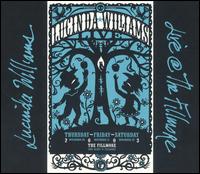
Live at the Fillmore is a live album by American singer-songwriter Lucinda Williams, her eighth album overall, released on May 10, 2005, by Lost Highway Records.
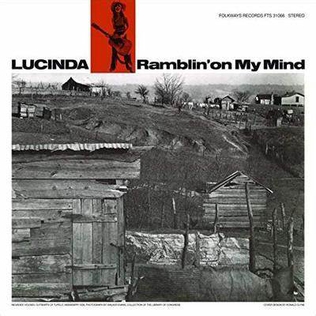
Ramblin' on My Mind is the debut studio album by American singer-songwriter Lucinda Williams, released in 1979, by Folkways Records.

"Get Right With God" is a song written and performed by American singer-songwriter Lucinda Williams. It was released in 2001 as the second single from her sixth album, Essence (2001).

West is the eighth studio album by American singer-songwriter Lucinda Williams, released on February 13, 2007, by Lost Highway Records. The album debuted at No. 14 on the Billboard 200, selling about 57,000 copies that week. According to Nielsen SoundScan, the album had sold 250,000 copies in the United States by October 2008.
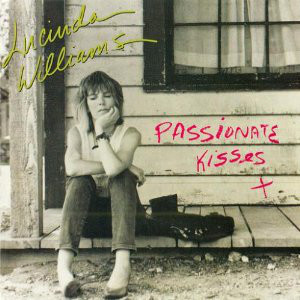
"Passionate Kisses" is a song written and performed by American singer-songwriter Lucinda Williams. It was released in 1989 as the fourth single from her third album, Lucinda Williams (1988).

Blessed is the 10th studio album by American singer-songwriter Lucinda Williams, released on March 1, 2011, by Lost Highway Records. The album debuted at No. 15 on the Billboard 200.
James Nelson Williams, known by the stage name D Train, is an American singer, songwriter, instrumentalist, producer and actor. He rose to fame in the early 1980s with the release of his first album “You're the One for Me”, which spawned his first US Billboard Dance chart number-one hit, "You're the One for Me". His debut album would also chart with the hits "Keep On" and the much covered Burt Bacharach hit "Walk on By". He would go on to work with Eaves producing hits on the follow-up albums Music and Something's on Your Mind before being signed to Columbia Records, producing the albums Miracles of the Heart and In Your Eyes. The two parted ways in 1988 and D Train went on to perform on his own label, releasing the album 701 Franklin Ave.

The discography of Lucinda Williams, an American singer, songwriter, and musician, consists of 15 studio albums, one live album, two video albums, and 25 singles, on Folkways Records, Smithsonian Folkways, Rough Trade Records, Chameleon, Mercury Records, Lost Highway Records, New West Records, Highway 20 Records, and Thirty Tigers.
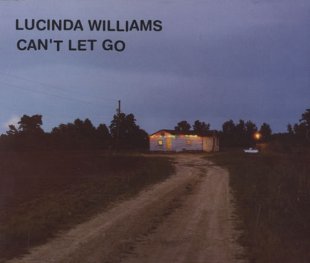
"Can't Let Go" is a song written by American singer-songwriter Randy Weeks, made famous by Lucinda Williams in 1998–1999. Williams released "Can't Let Go" as a single from her album Car Wheels on a Gravel Road, and the song entered the Billboard Adult Alternative Airplay chart in December 1998, peaking at number 14 in March 1999, staying on the chart for 13 weeks. Williams earned a Grammy nomination for the song in the category Best Female Rock Vocal Performance. Weeks released his own version of the song in 2000, on his album Madeline.
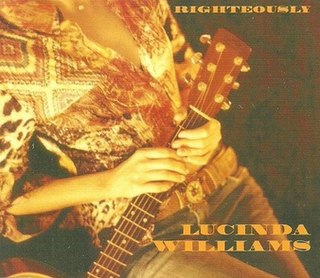
"Righteously" is a song written and performed by American singer-songwriter Lucinda Williams. It was released in 2003 as the first single from her seventh album, World Without Tears (2003).

"Are You Alright?" is a song written and performed by American singer-songwriter Lucinda Williams. It was released in 2007 as the first single from her eighth album, West (2007).

"Right in Time" is a song written and performed by American singer-songwriter Lucinda Williams. It was released in 1998 as the first single from her fifth album, Car Wheels on a Gravel Road (1998).
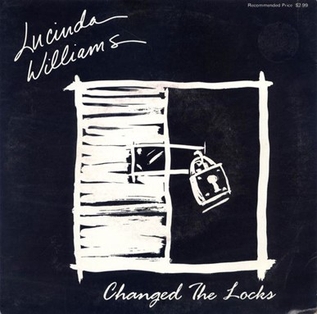
"Changed the Locks" is a song written and performed by American singer-songwriter Lucinda Williams. It was released in 1989 as the first single from her third album, Lucinda Williams (1988).

"Something About What Happens When We Talk" is a song written and performed by American singer-songwriter Lucinda Williams. It was released in 1993 as the fourth single from her fourth album, Sweet Old World (1992).

"Buttercup" is a song written and performed by American singer-songwriter Lucinda Williams. It was released in 2011 as the first single from her 10th album, Blessed (2011).


















